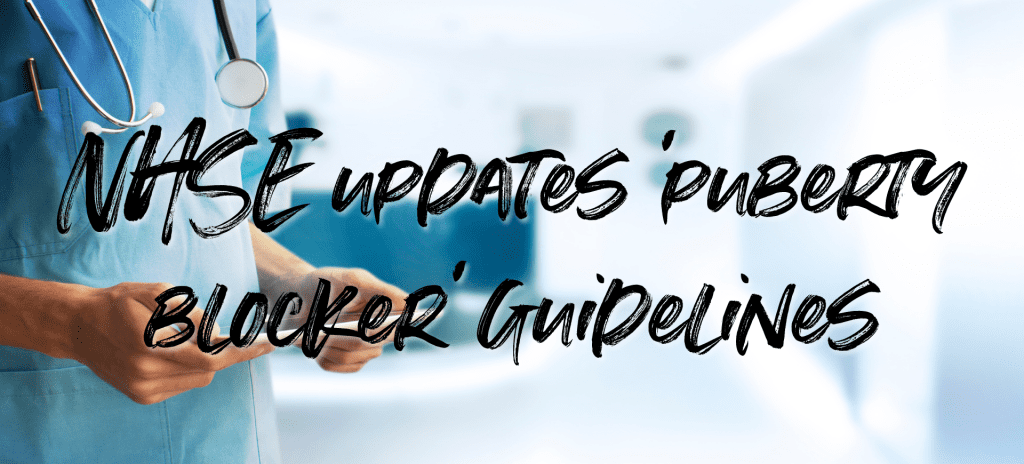
NHS England has updated the guidelines it uses around ‘puberty blockers’ for under 16s. It follows a High Court case in late 2020 which effectively stopped trans young people getting vital access to medication without having to go to court first. Then, a High Court case in March, 2021, ruled that young people could get access to puberty blockers as long as they had the support of their parents/guardians and practitioners.
Now, after almost three weeks, NHS England has updated its guidelines to fall into line with the law. Let’s take a look at what’s changed and what it means for trans youth:
- Broadly, this is a positive step forward so long as you have the support from home. For these people, it means ‘best interest orders’ are not mandatory if the young person has consent from their parents and a clinical recommendation
- The ‘Review Group’ is essentially a new part of the process that will have an independent panel decide whether a clinical decision around puberty blockers is correct and to ensure everyone is in agreement
- “The review group’s role is not to endorse or refuse treatment – it is there to ensure appropriate decision-making processes have been followed, particularly with regard to assessing and supporting consent to treatment.”
- Should the review group have ‘any doubts’ about whether the decision-making process was robust a best interest order application may be applied for still
- This is an interim position – may review it again following the Cass Review and the Bell Appeal, which we hear will be heard this summer
New patients
- Post Bell, all new referrals were paused. This update seems to suggest that new referrals can recommence, but a best interest order is still required until the Review Groups are ‘up and running’ (see point 2 below)
- NHSE have said they will provide more information around how a young person yet to commence on PBs will be supported in due course (see point 3 below)
Questions still remaining
- What about kids without support?
- When are the Review Groups going to be up and running?
- What specific timeline can be assigned to ‘in due course’?
- How will this new process impact already overlong waiting times?

Written by Lui Asquith, Director of Legal & Policy
The Bell case in December 2020 came as a huge blow to trans young people in this country. It resulted in NHSE stating that all trans young people would have to get a court order before accessing healthcare, namely puberty blockers.
We have seen first hand at Mermaids the impact the Bell case has had, which resulted in trans people having the support they desperately needed, suddenly removed. It left a population of young people in this country in desperate limbo, not knowing where to go or what to do.
Then came the ‘AB v CD’ case in March of this year, which was a family law case that decided parents could consent to puberty blockers on behalf of their child. Since the judgment was handed down, we have been waiting for NHSE to update its service specification in line with it. Now, after nearly 3 weeks and it finally has – you can find it here: https://www.england.nhs.uk/commissioning/spec-services/npc-crg/gender-dysphoria-clinical-programme/update-following-recent-court-rulings-on-puberty-blockers-and-consent/
If you read the update, you’ll see it’s a bit of a mixed bag. Those with the support of their parents may be able to access puberty blockers without a court process should an independent ‘review group’ agree with the clinical recommendation. The review group seems to have the role of ensuring that everyone is in agreement and that the clinical recommendation is the right one. The problem is, we don’t know exactly what the Review Group will look like, when this process will start, how long it will take or what the process will be. We also can’t really see why this additional element is legally necessary when it is ordinarily a clinician that will sign off the consent process. We’ll be chasing for more information and clarification in respect of this. We are of course concerned that this will add a further period of time on to a process that can already take years. We ask that this extra component to the process is implemented in a way that will not further prejudice access to necessary treatment.
As before, those already on puberty blockers should not have their treatment withdrawn, but it seems also that those who are yet to commence on blockers (and were asked to wait post Bell) will still be required to obtain a court order until the Review Groups are up and running. We don’t know when this will be. Again, we will be chasing for an answer. We hope the ‘review groups’ aren’t being ‘organised’ for the next 3 months. We will be putting pressure on NHSE to get this process going and to ensure that these young people are offered with the support they need. The support that hasn’t been there now for over 4 months.
Another major concern with this new policy position is that we know not every trans young person has the support of their parents. Where does this leave them? In short, it leaves them with the Bell system. And we know that in practice, the GIDS system requires the support of the parent before they pursue with treatment in most circumstances. We say this isn’t good enough. We will continue to advocate for the right of all young trans people to be able to consent to treatment in the same way non-trans young people are able to. Bodily autonomy must not be dependent on having a conventional gender history .
FAQs
- How does this update impact young people already on blockers?
As far as we understand it, the Tavistock centre will continue to review all cases to confirm that the people with parental responsibility, young person and clinician all agree that puberty blockers are in the young person’s best interests. Treatment will not be removed in the meantime while the young person waits for the outcome of the review.
The independent ‘Review Group’ will then review the decision making process that was undergone by people with parental responsibility and the Tavistock centre to see if it was thorough enough. If the Review Group has any doubts that the decision making process wasn’t thorough enough, then the Tavistock centre will have to make a best interests application to the court.
We are unsure whether the Review Groups have been set up for those already on blockers. We will try and find this out.
- How does this update impact young people who were waiting to start on blockers?
As far as we know, referrals to the endocrine service are still currently on pause. When they start again, the new ‘Review Group’ process will be followed. However, until the new independent group review is set up, it seems that the Tavistock will still have to get a best interests order from the court before prescribing. To date, no applications have been made and we are unsure how long this process will take.
- Does this update mean I don’t have to go to court anymore?
Maybe. It seems that this will depend on the ‘Review Groups’ being up and running. Until then, it looks as though Best Interest Order court applications will still have to be applied for. And again, even once this process is in motion, it will only help those who have the support of their parents.
If you have an experience that can provide us with more information and incite, please let us know and email [email protected]
